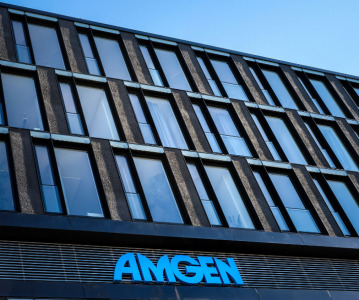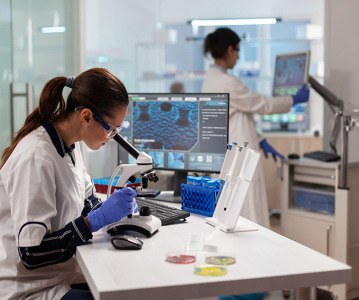Manufacturing of life-enhancing medicines boosted by new government funding

Patients could receive faster treatment following boost to streamline the production of medicines and treatments.
Patients could soon receive faster treatment thanks to a multimillion pound government boost to streamline the production of medicines and treatments, including those used to treat blood cancers and inherited disorders.
Companies in Northumberland, Oxford and London will adopt new digital technologies, such as artificial intelligence, to support the manufacture of next-generation medicines and treatments.
The £4.3 million funding aims to create more efficient and innovative methods for manufacturing medicines. The challenge works to set the UK apart as a leader with greater capacity for manufacture of safe, affordable and effective therapies.
Life Sciences Minister Lord Henley said: "New technology can help us live longer, healthier lives and the new projects announced today will improve the speed and accuracy with which medicines get to the people that need them.
"Advances in technology can help us address the challenges that an ageing society presents and we are backing the technologies of tomorrow in our modern Industrial Strategy, with the biggest increase in public research and development investment in UK history."
The three individual projects are:
One year on from the launch of the Industrial Strategy, this £7.3 million investment is the latest commitment from the £180 million Industrial Strategy Challenge Fund (ISCF) dedicated to leading-edge Medicines Manufacturing.
Taking steps to improve patient access to life-saving treatments and medicines, Advanced Therapy Treatment Centres, working across the UK, will support the roll-out of cell and gene therapies as clinical trials show them to be safe and cost-effective. The centres bring together expert clinicians, researchers, scientists, developers and private companies to demonstrate how the therapies have impact on patients’ lives.
Advanced therapies, including cell and gene therapies, represent the next generation of therapies that have the potential to offer treatments for a number of conditions including some blood cancers and inherited conditions for which there are currently limited treatment options.
UK Research and Innovation (UKRI) is responsible for managing the Industrial Strategy Challenge Fund, which funds the winners of the Medicines Manufacturing Challenge.
Dr Ian Campbell, Interim Executive Chair, Innovate UK for UKRI, said: "The projects announced today will bring real benefits to patients and boost the knowledge economy as part of the government’s modern Industrial Strategy. This is vital for the UK as a global leader in the development of advanced therapies and medicine manufacturing."
Related News
-
News Eli Lilly gets ready to launch five new drugs in 2023
Eli Lilly, the American pharmaceutical company (IN, USA) are gearing up for a big year ahead, with hopes to launch five new drugs and capitalise on growing obesity and Alzheimer’s disease markets. -
News Amgen buys Horizon for $27.8 billion in bold step into the rare disease market
Amgen Inc buys pharmaceutical company Horizon Therapeutics in a multibillion-dollar deal, in hopes to capitalise on it's portfolio of drugs in the highly sort after rare disease market. -
News Pharma Supply Chain People Moves
The latest appointments and promotions across the pharmaceutical supply chain. -
News Merck to donate new Ebola vaccine to defend against outbreaks in Uganda
Pharmaceutical giant Merck has announced they will be speeding up the processing of a new vaccine against the latest strain of the Ebola virus, to be donated to a global non-profit organisation for distribution -
News CPHI Podcast Series: Driving innovation with pharmaceutical startups
The latest episode in the CPHI Podcast Series explores how startups are driving innovation by taking high-risk approaches and doing business with greater agility. -
News Greener and efficient processes: Quaternary Ammonium Salts
Quaternary Ammonium Salts play a crucial part in Organic Chemistry processes at many major industries. Discover why.
-
News Biosimilars save patients $11B annually, but barriers to adoption remain in US market
Biosimilars introduce competition into the biologics market, driving down prices and increasing patient access. -
News WHO recommends use of two monoclonal antibody treatments against Ebola
The health body recommended use of treatments by Regeneron and Ridgeback Bio
Position your company at the heart of the global Pharma industry with a CPHI Online membership
-
Your products and solutions visible to thousands of visitors within the largest Pharma marketplace
-
Generate high-quality, engaged leads for your business, all year round
-
Promote your business as the industry’s thought-leader by hosting your reports, brochures and videos within your profile
-
Your company’s profile boosted at all participating CPHI events
-
An easy-to-use platform with a detailed dashboard showing your leads and performance




.png)


